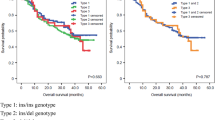Abstract.
Background:
Host genetic factors may play a key role in determining the long-term outcome of the Helicobacter pylori infection. Toll like receptor 4(TLR4) and CD14-mediated recognition of lipo-polysaccharide (LPS) is required for efficient recognition of Gram-negative bacterial infections.
Aims:
We investigated the effects of common polymorphisms of TLR4 Asp299Gly, Thr399Ile and CD14 promoter –C159T on the risk of gastric cancer including its subtypes and clinicopathologic features. We also investigated the effects of these polymorphisms on histologic degree of H. pylori induced gastritis.
Subjects:
The study was performed in 149 gastric cancer(GC) cases [mean age 64.0 ±12.4, M:F = 109:40] and 94 patients without evidence of GC (mean age 64.1 ±12.3, M:F = 65:25, Peptic ulcer diseases = 43.6 %, gastritis = 56.4 %) as the control group.
Methods:
TLR4 Asp299Gly, Thr399Ile and CD14 promoter – C159T were determined by PCR-RFLP in all the patients. Gastritis scores of non-cancerous gastric mucosa were assessed according to the updated Sydney system in H. pylori-positive subjects(n = 174).
Results:
The frequencies of CD14-260 TT and T carrier were significantly lower in patents with intestinal type gastric cancer than in controls (OR = 0.31;95 % CI = 0.12–0.78, OR = 0.38; 95 % CI = 0.18–0.81, respectively) Compared with patients older than 61 years, the atrophy score in antrum was significantly lower in TT and CT patients.TLR4 Asp299Gly, Thr399Ile were not detected in all the patients.
Conclusion:
Our data suggest that CD14 promoter-159TT and T carrier were associated with lower risk of developing gastric mucosal atrophy in H. pylori infected patients more than 61 years of age, and these genotypes may reduce the risk of intestinal type gastric cancer and TLR4 Asp299Gly, Thr399Ile are very rare in the Japanese population.
Similar content being viewed by others
Author information
Authors and Affiliations
Corresponding author
Additional information
Received 12 July 2006; accepted 17 August 2006
Rights and permissions
About this article
Cite this article
Tahara, T., Arisawa, T., Shibata, T. et al. Association of polymorphism of TLR4 and CD14 genes with gastroduodenal diseases in Japan. Inflammopharmacol 15, 124–128 (2007). https://doi.org/10.1007/s10787-006-1567-8
Issue Date:
DOI: https://doi.org/10.1007/s10787-006-1567-8




